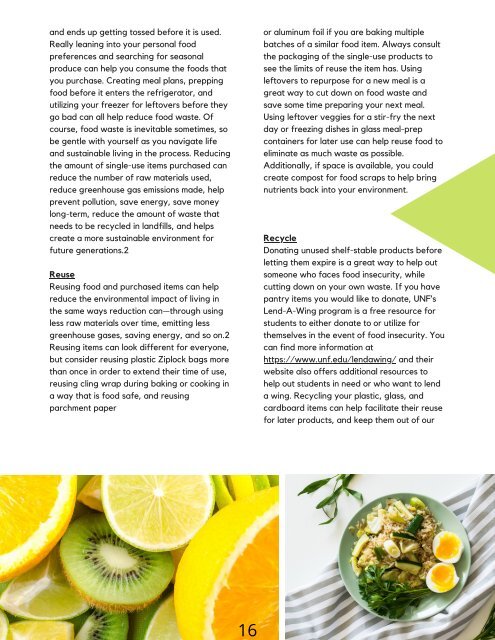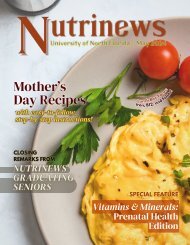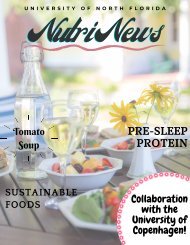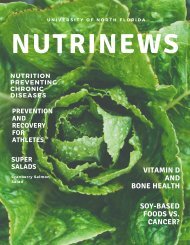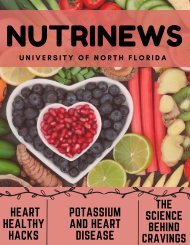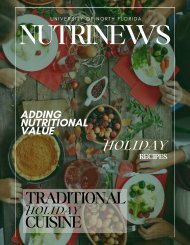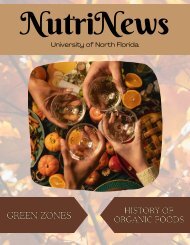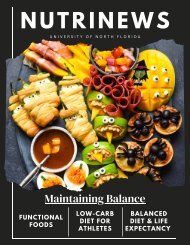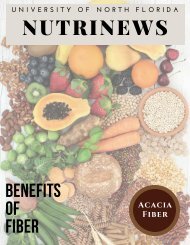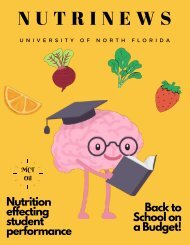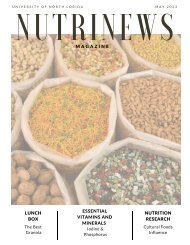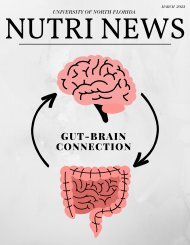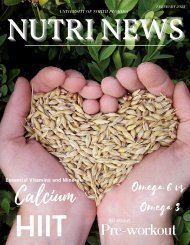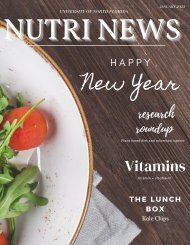April Issue of NutriNews
Hello all! The theme for April is Sustainability. Topics include Nutrition research and tips to reduce food and household waste. This month’s student spotlight is on our very own Mark Stemmerman. I hope you all enjoy, learn, and get inspired by this month’s articles and recipes!
Hello all!
The theme for April is Sustainability. Topics include Nutrition research and tips to reduce food and household waste. This month’s student spotlight is on our very own Mark Stemmerman.
I hope you all enjoy, learn, and get inspired by this month’s articles and recipes!
- No tags were found...
Create successful ePaper yourself
Turn your PDF publications into a flip-book with our unique Google optimized e-Paper software.
16<br />
and ends up getting tossed before it is used.<br />
Really leaning into your personal food<br />
preferences and searching for seasonal<br />
produce can help you consume the foods that<br />
you purchase. Creating meal plans, prepping<br />
food before it enters the refrigerator, and<br />
utilizing your freezer for leftovers before they<br />
go bad can all help reduce food waste. Of<br />
course, food waste is inevitable sometimes, so<br />
be gentle with yourself as you navigate life<br />
and sustainable living in the process. Reducing<br />
the amount <strong>of</strong> single-use items purchased can<br />
reduce the number <strong>of</strong> raw materials used,<br />
reduce greenhouse gas emissions made, help<br />
prevent pollution, save energy, save money<br />
long-term, reduce the amount <strong>of</strong> waste that<br />
needs to be recycled in landfills, and helps<br />
create a more sustainable environment for<br />
future generations.2<br />
Reuse<br />
Reusing food and purchased items can help<br />
reduce the environmental impact <strong>of</strong> living in<br />
the same ways reduction can—through using<br />
less raw materials over time, emitting less<br />
greenhouse gases, saving energy, and so on.2<br />
Reusing items can look different for everyone,<br />
but consider reusing plastic Ziplock bags more<br />
than once in order to extend their time <strong>of</strong> use,<br />
reusing cling wrap during baking or cooking in<br />
a way that is food safe, and reusing<br />
parchment paper<br />
or aluminum foil if you are baking multiple<br />
batches <strong>of</strong> a similar food item. Always consult<br />
the packaging <strong>of</strong> the single-use products to<br />
see the limits <strong>of</strong> reuse the item has. Using<br />
leftovers to repurpose for a new meal is a<br />
great way to cut down on food waste and<br />
save some time preparing your next meal.<br />
Using leftover veggies for a stir-fry the next<br />
day or freezing dishes in glass meal-prep<br />
containers for later use can help reuse food to<br />
eliminate as much waste as possible.<br />
Additionally, if space is available, you could<br />
create compost for food scraps to help bring<br />
nutrients back into your environment.<br />
Recycle<br />
Donating unused shelf-stable products before<br />
letting them expire is a great way to help out<br />
someone who faces food insecurity, while<br />
cutting down on your own waste. If you have<br />
pantry items you would like to donate, UNF’s<br />
Lend-A-Wing program is a free resource for<br />
students to either donate to or utilize for<br />
themselves in the event <strong>of</strong> food insecurity. You<br />
can find more information at<br />
https://www.unf.edu/lendawing/ and their<br />
website also <strong>of</strong>fers additional resources to<br />
help out students in need or who want to lend<br />
a wing. Recycling your plastic, glass, and<br />
cardboard items can help facilitate their reuse<br />
for later products, and keep them out <strong>of</strong> our


